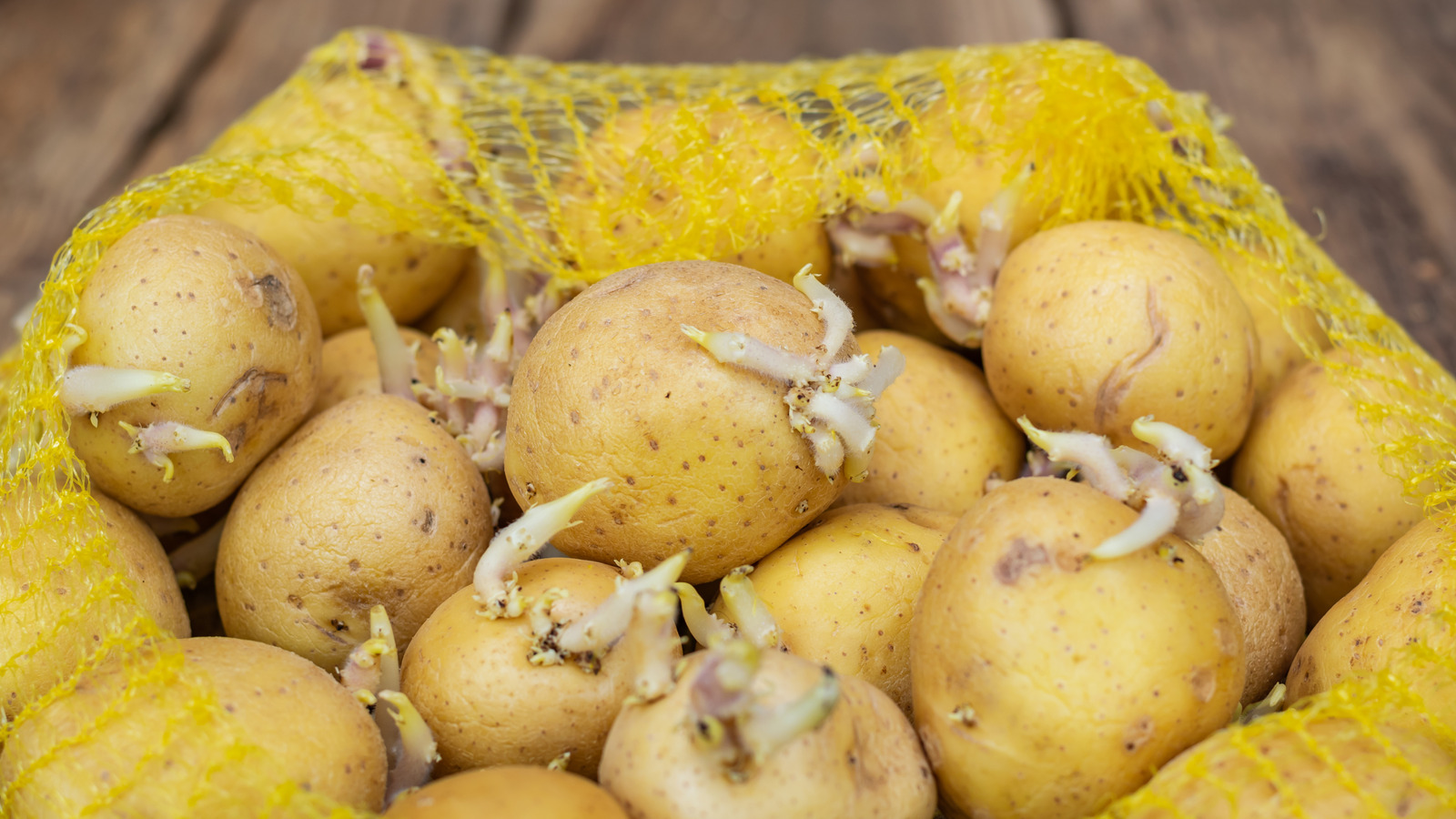There are few foods as versatile as potatoes. Whether you mash them, fry them, or nestle them beside a roast in your crock pot, these budget-friendly veggies are a tasty addition to any meal. Spuds are also packed with nutrients like vitamin C and potassium, plus an average of 2 grams of fiber in a 5.
3-ounce potato. All this fiber is good for your digestive health — and contrary to popular belief, a potato's nutrients aren't all in its skin. But do you need to toss them in the trash if you see a few sprouts? Not at all.

Who hasn't forgotten about that bag of potatoes at the bottom of your pantry? We certainly have, and it's pretty likely that you're going to see a sprout or two coming out of those eyes on occasion. Some say they're toxic, while others say they're ideal for planting, but what's the real truth? There are tons of myths about these tasty tubers and their buds that we're going to put to bed now. Here are eight false facts about sprouted potatoes you thought were true.
False: All sprouted potatoes are toxic to eat Potatoes are part of the nightshade family, alongside other vegetable staples like tomatoes and peppers, and they contain glycoalkaloids called solanine and chaconine. These chemical compounds act as the plant's self-defense mechanism against bacteria, fungi, and even insects that want to munch on their leaves. Once potatoes sprout, the concentration of these substances soars.
These naturally occurring toxins can cause a potato to take on a bitter taste and eating too many glycoalkaloids may lead to an upset stomach. So, what do you need to know to keep your family safe from these unpleasant substances in a humble spud? A potato that has sprouted is safe to eat so long as it's firm to the touch, and only if the sprouts haven't grown too long. Make sure you don't eat the sprouts, either.
These little buds are not edible, but because they are easy to remove with a vegetable peeler or a fork , there's no need to get rid of the whole tuber. Removing the potato's skin before tossing it in a pot can reduce its glycoalkaloid content to a safe level. False: You can plant sprouted grocery store potatoes in your garden Many of us look at a sprouted potato in the cupboard and think, wow, I should plant this! While you technically can plant a sprouted grocery store potato, opting for a seed potato from a garden supply store is a much better option.
While potatoes are an easy and reliable crop for home gardening, old store-bought spuds, called ware potatoes, may have diseases that could affect the other vegetables you're cultivating in your garden. Common plant pathogens, like the fungus blight, won't necessarily harm people but they may spread to other vegetables, particularly tomatoes and eggplants, and this can destroy your harvest in just days. We agree that it's tempting to skip the produce aisle at your local grocer and grow a few hills in your backyard.
However, in addition to the potential to spread plant-borne pathogens around your rows, ware potatoes intended for eating may be a type of USDA-approved genetically modified spud. The GMO process isn't an issue for all of us, but many gardeners avoid sowing plants that are bioengineered for a variety of reasons. Because there are no labeling requirements for these potatoes in the U.
S., you never know if you've got one, unless it's organic. False: You can compost sprouted potato peels Many of us have jumped on the composting bandwagon, and for great reasons.
If you're looking to reduce waste and create your own nutrient-dense soil, it's an environmentally friendly option that's easy to start up. After all, removing the peel from a sprouted potato is one of the best ways to preserve its goodness before cooking and you definitely don't want to send them down the garbage disposal . But before you trash those food scraps, you might assume that they'll be a great addition to your compost pile.
Don't do it! While adding those sprouted potato peels to your compost heap isn't the end of the world, peels that are rotten or diseased could grow potato blight. Store-bought spuds are the ideal carriers for this fungus, and because it overwinters in your compost, come spring when you're ready to use it to fertilize your garden beds — oops! — you've just spread this pathogen around your plants. Even whole sprouted potatoes are unwelcome in your compost pile because they may start growing in your carefully cultivated nitrogen-rich soil.
False: Cold storage prevents potatoes from sprouting Potatoes don't have a tremendously long shelf life — they may begin to sprout after sitting on your counter after just a few weeks. Because your kitchen's warm, humid environment mimics the plant's ideal growing conditions, you may assume that storing them in your crisper drawer would prevent those eyes from sprouting. Well, that's another potato myth you thought was true.
Refrigerators should ideally maintain temperatures between 33 and 40 degrees Fahrenheit, but most of these appliances run warmer due to several factors, like dirty condenser coils or blocked air vents. If the inside of yours exceeds that 40-degree threshold, it may send a signal to your potato that it's time to sprout. Even being exposed to light whenever the door is open can trigger a spud's natural growth process.
There is a proper way to store your potatoes for the best chance at longevity, though. Cool and dry is best here, like inside your cellar or a rarely used closet. False: Potatoes sprout because they're rotten Whether you buy them by the pound or by the spud, if you expose potatoes to sunlight, they'll start sprouting eventually — but that doesn't necessarily mean they're rotten.
Sprouting is a natural process caused by the ideal combination of environmental factors, like temperature, light, and moisture. This process means that the potato is using its stored energy to produce shoots and roots so it can grow into a new plant. If there are just a few buds protruding from the skin, your tasty tuber is far from rotten.
There are six tell-tale signs that your potato has truly gone bad , and you'll want to make sure you're familiar with all of them. Small sprouts may look unappealing, but your spud is really absolutely fine once you pick them off. However, if your potato is soft, smells like mold, or is leaking brown goo, it's definitely time to let it go and throw it away.
False: There's nothing you can do with a sprouted potato There are actually tons of things you can do with a sprouted potato, assuming it hasn't reached the point of no return. Simply remove the sprouts and any green areas and cook them as you normally would. Even if you're not ready to dine on them just yet, you can easily bake, hash, or mash your spuds, then freeze them.
You can try freezing them uncooked too — while some kinds of potatoes freeze better than others , cold storage will prevent the eyes from continuing to grow so long that they're no longer safe to eat. If you just can't bring yourself to munch on a sprouted tater, you can always use them to teach your kids about botany. Just jab the tuber with a few toothpicks, place it sprout-side-down in a cup of water, and watch it grow.
While you probably shouldn't expect it to yield a bushel of spuds (after all, it's not a seed potato), watching it grow leaves is fun for the whole family. False: Cooking sprouted potatoes removes glycoalkaloids One of the top concerns many of us have about eating sprouted potatoes is their elevated levels of glycoalkaloids. Some folks think that cooking spuds will remove these natural chemical compounds.
Sadly, that's a false fact. Even cooking peeled, sprouted potatoes will not significantly decrease the number of toxins if the eyes have been allowed to grow out too long. This is because their starchy little centers will still contain those higher levels of glycoalkaloids.
Some cooking methods are better at removing these substances than others, though. High heat methods, like frying and boiling, may help to reduce the levels to some extent. A study published in the Journal of Experimental and Basic Medical Sciences suggests that boiling spuds reduces their toxic levels by just 1.
2 percent, while frying them at 410 F for at least 10 minutes may reduce solanine by 40 percent. Microwaving a spud also helps drop a spud's glycoalkaloid levels by 15 percent — if you're using the microwave, try wrapping your potato in a damp paper towel first, so it cooks perfectly. However, even those techniques may not be enough to prevent stomach upset caused by sprouted taters too far past their prime.
False: All sprouted potatoes are safe to eat For the most part, it's true that minorly sprouted potatoes are perfectly safe to eat, but not all of them meet this threshold. Taters with sprouts that have grown longer than half an inch should not be eaten at all. It's important to trust your gut here, and if you're unsure your bag of spuds is still edible, go ahead and toss it.
Spuds with extensive green spots or patches on their skin are also undesirable. Exposure to light triggers the potato's chlorophyll production, which leads to higher levels of solanine. It's probably best to discard spuds with this unmistakable discoloration, as this is a clear indication that there may be some undesirable chemicals lurking under that peel.
You should also avoid eating potatoes that have grown buds if you're pregnant. There's some evidence that doing so could cause developmental issues for your growing baby, particularly within the first 10 weeks of gestation..
Food

8 False Facts About Sprouted Potatoes You Thought Were True

Those potatoes that have been sitting in your kitchen for so long that they're starting to sprout don't necessarily need to be thrown away. Here are the facts!















